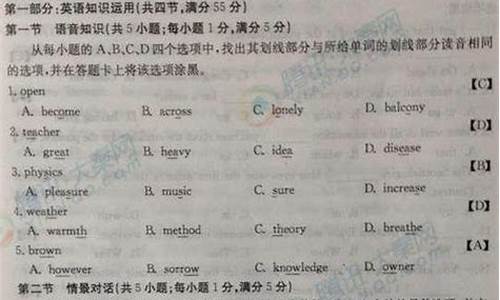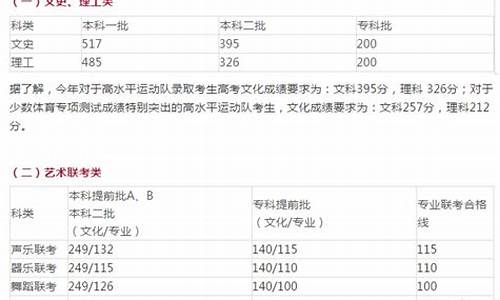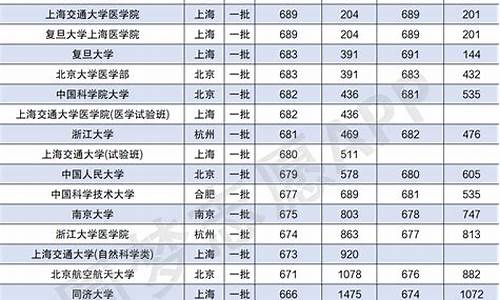您现在的位置是: 首页 > 教育改革 教育改革
2014高考英语陕西卷答案解析_陕西2014高考英语
tamoadmin 2024-06-29 人已围观
简介1.历年陕西省成人高考英语试题资料?构成时态的助动词be (is, am, are), have (has), shall, will 等需根据主语的变化来选择。时态是英语中一个重要的语法范畴,它表示不同时间发生的动作或存在的状态以及动作发生或存在的方式。动作发生的时间可分为现在、过去、将来和过去将来四种形式,动作发生的方式可分为一般、完成、进行和完成进行四种形式。将时间形式和动作方式结合起来,就
1.历年陕西省成人高考英语试题资料?

构成时态的助动词be (is, am, are), have (has), shall, will 等需根据主语的变化来选择。
时态是英语中一个重要的语法范畴,它表示不同时间发生的动作或存在的状态以及动作发生或存在的方式。动作发生的时间可分为现在、过去、将来和过去将来四种形式,动作发生的方式可分为一般、完成、进行和完成进行四种形式。将时间形式和动作方式结合起来,就构成了以下
一 般
完 成
进 行
完 成 进 行
现 在
现在一般时
do
现在完成时
have done
现在进行时
is doing
现在完成进行时
have been doing
过 去
过去一般时
did
过去完成时
had done
过去进行时
was doing
过去完成进行时
had been doing
将 来
将来一般时
will do
将来完成时
will have done
将来进行时
will be doing
将来完成进行时
will have been doing
过去将来
过去将来一般时
would do
过去将来完成时
would have done
过去将来进行时
would be doing
过去将来完成进行时
would have been doing
英语的时态是靠动词的变化和时间状语来表达的。英语中的时态共有十六种,但是常考的或较常用的只有9种。 要掌握英语的时态和语态,必须掌握好英语中的助动词(do, be, have)和时间状语这两个核心问题。
1、一般现在时
主要用来表示人、事物的现在状况和特点;表示经常或习惯性的动作,句子中常有often, always, from time to time 等时间状语; 表示客观规律和永恒真理等。
He usually goes to work at 7 o’clock every morning. 他每天7点上班。
2、现在进行时
表说话时或目前一段时间内正在进行的活动:或表感彩,加强语气。与频率副词,如always,constantly,continually,again等连用表示说话人的某种感彩(赞叹、厌烦、埋怨等)。
We are having English class.
我们正在上英语课。
3、现在完成时
表示动作发生在过去,完成在过去,但强调与现在情况仍有联系,其结果或影响仍存在。
They have lived in Beijing for five years.
他们在北京已经住了5年了。
4.一般过去时
表在过去某个特定时间发生且完成的动作,或过去习惯性动作,不强调对现在的影响,只说明过去。常跟明确的过去时间连用,如:yesterday; last week; in 1945, at that time; once; during the war; before; a few days ago;
He used to smoke a lot.
他过去抽烟比较厉害。
5. 过去进行时
表示过去某个时间点或某段时间内正在发生的动作。
Beijing was hosting the 29th Olympic Games in August 2008.
在2008年8月,北京正在举行29届奥运会。
6. 过去完成时
表示过去某个时间之前已经完成的动作,即过去完成时的动作发生在“过去的过去”,句中有明显的参照动作或时间状语,这种时态从来不孤立使用 ( before, after, by, up till )
They finished earlier than we had expected.
他们提前完成了(工作)。
7. 一般将来时
表在将来某个时间会发生的动作或情况。常和tomorrow, next year, in 2008等表示将来的时间状语连用。
I am leaving for Beijing tomorrow.
我明天就要离开北京。
8、将来进行时
表将来某个时间正在发生的动作,或按计划一定会发生的事情。
I’ll be doing my homework this time tomorrow. 明天这会我正在写作业。
9、将来完成时
表在将来某时刻之前业已完成的事情,时间状语非常明显。常用的时间状语一般用by+将来的时间。如:by the end of this year, by 8 o’clock this evening, by March next year以及由by the time…, before或when等引导的副词从句。
By the end of next month, he will have traveled 1000 miles on foot.
到下个月底,他步行将达到1000英里。
英语共有十六个时态、四个体。(注:四个体为——一般、进行、完成、完成进行。)
英语中的四个体相当于法语、西班牙语以及所有印欧语系罗曼语族中的式,如:直陈式,命令式等。
(1)一般现在时
基本形式(以do为例):
第三人称单数:does(主语为非第三人称单数);
肯定句:主语+动词原形+其他;
He works for us.
否定句:主语+don‘t/doesn't+动词原形+其他;
He doesn't work for us.
一般疑问句:Do/Does+主语+动词原形+其他。
肯定回答:Yes,(+ 主语+do/does).
否定回答:No,(+主语+don't/doesn't.)
特殊疑问句:疑问词+一般疑问句语
Does he work for us?
Yes, he does.
No, he doesn't
What does he do for us?
He works for us.
(2)一般过去时
be动词+行为动词的过去式
否定句式:在行为动词前加didn‘t,同时还原行为动词,或was/were+not;
was或were放于句首;用助动词do的过去式did提问,同时还原行为动词
例如: Did he work for us?
He didn't work for us.
He worked for us.
(3)一般将来时
am/are/is+going to+do 或
will/shall+do
am/is/are/about to + do
am/is/are to + do;
一般将来时的表达方法
be going to +动词原形
be +不定式,be to+动词原形,be about to +动词原形
be able to +不定式
be about to+动词原形
will + 动词原形;
例如:He is going to work for us.
He will work for us;
He is coming.这是特殊的用一般现在时 表达 将来时态 的例子!!
(4)过去将来时
be(was,were)going to+动词原形
be(was,were)about to+动词原形
be(was,were)to+动词原形
肯定句:主语+be(was,were)going to+动词原形~.
否定句:主语+be(was,were)not going to+动词原形~.
疑问句:Be(Was,Were)+主语+going to+动词原形~?
肯定句:主语+would(should)+动词原形~.
否定句:主语+would(should)not+动词原形~.
疑问句:Would(Should)+主语+动词原形~?
He would work for us.
(5)现在进行时
主语+be+v.ing〔现在分词〕形式(其中v表示动词)
表示现在正在进行的动作或最近在做的事。
例如:I am buying a book.
第一人称+am+doing+sth
第二人称+are+doing +sth (doing是泛指所有的v-ing形式)
第三人称+is+doing+sth
例:He is working.
(6)过去进行时
肯定句:主语+was/were+doing+其它
否定句:主语+was/were+not+doing+其它
一般疑问句及答语:Was/Were+主语+doing+其它 ;答语:Yes,I主语+was/were./No,I主语+wasn't/weren't.
特殊疑问句:特殊疑问词+was/were+主语+doing+其它
He was working when he was alive.
(7)将来进行时
主语+will + be +现在分词
He will be working for us.=He will work for us.
(8)过去将来进行时
should(would)+be+现在分词
He said that he would be working for us.=He said that he would work for us.
(9)现在完成时
基本结构:主语+have/has+过去分词(done)
①肯定句:主语+have/has+过去分词+其他
②否定句:主语+have/has+not+过去分词+其他
③一般疑问句:Have/Has+主语+过去分词+其他
④特殊疑问句:特殊疑问词+一般疑问句(have/has+主语+过去分词+其他\
He has worked for us for ten years.
Has he worked for us for ten years.
(10)过去完成时
基本结构:主语+had+过去分词(done)
①肯定句:主语+had+过去分词+其他
②否定句:主语+had+not+过去分词+其他
③一般疑问句:Had+主语+过去分词+其他
肯定回答:Yes,主语+had
否定回答:No,主语+hadn't
④特殊疑问句:特殊疑问词+一般疑问句(had+主语+过去分词+其他)
语法判定:
( 1 ) by + 过去的时间点。如:
I had finished reading the novel by nine o'clock last night.
( 2 ) by the end of + 过去的时间点。如:
We had learnt over two thousand English words by the end of last term.
( 3 ) before + 过去的时间点。如:
They had planted six hundred trees before last Wednesday.
(11)将来完成时
(shall)will+have+动词过去分词
before+将来时间或by+将来时间
before或by the time引导的现在时的从句
He will have worked for us.=He will work for us.
(12)过去将来完成时
should / would have done sth.
He said that he would have worked for us.=He said that he would work for us.
(13)现在完成进行时
基本与现在完成时相同,但是现在完成进行时只能表示仍然持续的概念
have/has been +-ing 分词
He has been working for us for ten years.=He has worked for us for ten years.
(14)过去完成进行时
had been +-ing 分词
He said that he had been working for us for ten years.=He said that he had worked for us for ten years.
(15)将来完成进行时
主语+ shall/will have been doing
He will have been working for us.=He will work for us.
翻译为:他最近一直在为我们工作(过去在工作,现在在工作,将来还会工作)
(16)过去将来完成进行时
should+have been+现在分词用于第一人称
would have been+现在分词用于其他人称
He said that he would have been working for us.=He said that he would work for us.
举例:
英语中有12个主要时态,都来自于三时(过去、现在、将来)
现在以I listen为例,举例英语中有12个主要时态如下所示:
一般现在时:I listen
现在进行时:I am listening
过去进行时:I was listening
现在完成时:I have listened
现在完成进行时:I have been listening
一般将来时:I shall listen”或“I will listen.”
将来进行时:I shall be listening
一般过去时:I listened
过去完成时:I had listened
过去完成进行时:I had been listening
将来完成时: I shall have listened
将来完成进行时: I shall have been listening
英语中不存在属格
一个普遍的误解是在英语中只存在一个以“'s”结尾表示所属的属格。然而,语言学家已经表明英语的所有格完全不是一个格,而是一个独立的词并且在书写和发音上都不是前一个词的一部分,这可以有下面这个句子表明:The King of Sparta's wife was called Helen.(斯巴达国王的妻子叫做海伦。)如果“'s”是属格,那么“妻子”(wife)就属于“斯巴达”(Sparta),但是“'s”并不是只表示“斯巴达”(Sparta),而是表示“斯巴达国王”(King of Sparta)。
上面这个例子并不表明英语没有自己的属格;但是它现在已经发展成为另一个形式。在古英语中,ban的属格形式是banes。后来在现代英语中,这个发展成为了使用“'s”表示的“bone's”。在18世纪,人们对此的解释是省略号代替了一个属格代词,就像“the King's horse”是“the King, his horse”的缩写。但是这个解释是不正确的。人们更相信是省略号代替了古英语中的“e”。
英语和“与格”
在现代英语中,与格不再是英语语法的一部分,它只出现在一些表达用语中。一个很好的例子是单词methinks(据我看来)。它来源于古英语的与格形式变化:me(与格的人称代词)+thinks(to seem,与动词词组to think很接近的一个词组)。 与格在英语中可以不要前置词,例如在“He built me a snowman.”中一样。在这个例子中,“me”是与格。
英语中不可把被动语态作为一种时态
在部分英语教材中,由于编者自身对被动语态的理解或其他原因,错误的将被动语态当成一种时态,但其实,被动语态是一种语态,不可能当作时态。在英国,这是一个常识。因此,在英国,如果有人犯了这种错误,简直是贻笑大方。
历年陕西省成人高考英语试题资料?
The Shanghai Expo,In my opinion, is a huge and grand event in China as well as in the world. At the no-boundary worldf air, friends and guests from all over the world will come to Shanghai,China. An now many people both at home and abroad are talking about the changes it will bring to Shanghai and China. It is estimated that the environment will be more friendly and the roads will be cleaner,the air fresher,too. The Shanghai Expo will surly be a seconde hit to the whole world,following the Olympic Games,which is believed to be the best ever.
Since it is the biggest event,as a student, I want to do something for it to participate in the service of the world Expo.I'm looking forward to Shanghai World Expo being held in Shanghai. I believe that the Expo will surely be the same as the Olympic Games a complete success. If I could get the chance to be a volunteer there, I would do my best to offer my energy and strengh,to serve the guests and friends there. Serving at the Shanghai Expo is an honor, and also my glory,so I hope I can do something for the World Expo, in order to cheer the arrival of the Expo bar!
成考快速报名和免费咨询: 历年陕西省成人高考英语试题资料。很多人都说陕西成人高考英语很难。不知道怎么复习备考,找不到相关的复习资料。那么陕西成考网的小编给大家找来了历年陕西省成人高考英语试题资料。希望对考生有所帮助。
历年陕西省成人高考英语试题资料 一、语音知识(共5小题;每题1.5分,共7.5分。)
在下列每组单词中,有一个单词的划线部分与其他单词的划线部分的读音不同。找出这个词,并把它前面的大写字母填入左边括弧里。
( )1.A.machine B.dictionary C.Russian D.question
( )2.A.popular B.large C.remarkable D.dark
( )3.A.church B.chalk C.character D.cheat
( )4.A.cheat B.weak C.increase D.area
( )5.A.copy B.loudly C.today D.Monday
二、词汇与语法知识(共25小题;每题1.5分,共37.5分。)
从每小题的四个选择项中,选出最佳的一项,并把它前面的大写字母填入左边的括弧里。
( )6.—The sea isvery roughtoday. —Yes, I've never seen_______ before.
A.such rough sea B.such a rough sea C.so rough sea D.that rough sea
( )7.—She'sbroken her arm again. —Again? I______ she_______ ever broken it before.
A.don't know; has B.didn't know; had C.didn't know; has D.hadn't know; would
( )8.—Hasthe wallet been returned yet? —No, but we expect______ any day now.
A.to return it B.itto return C.itto be returned D.it returned
( )9.—I've beentoldto pay the rent. —But it'salready been paiD.It______ by someone else.
A.must be B.may be C.must be paid D.must have been paid
( )10. Montreal islarger than_______ in CanadA.
A.any city B.any cities C.any other cities D.any other city
( )11. Human'sbrainsare larger in proportionto their bodiesthan_______.
A.whales B.a whale C.that of whales D.those of whales
( )12. Before writing your article,______, collect your material, and prepare an outline.
A.atopic should be selected B.atopicto be selected C.yourtopic should be selected D.select atopic
( )13.—I usually travel by train. —Why not________ by plane for a change?
A.to try going B.tryingto go C.to try and go D.try going
( )14. The boy lay in the street, hiseyes_______ and hishands______.
A.closing; trembling B.closed; trembled C.closing; trembled D.closed; trembling
( )15. He_______ here for 20 yearsby the end of next month.
A.hadworked B.hasworked C.will have worked D.will work
成考有疑问、不知道如何总结成考考点内容、不清楚成考报名当地政策,点击底部咨询官网,免费领取复习资料:









